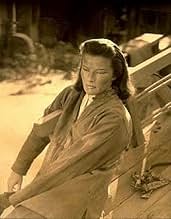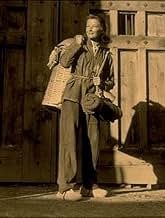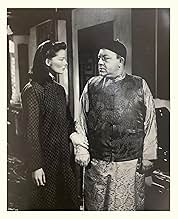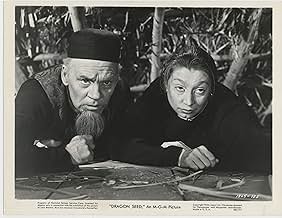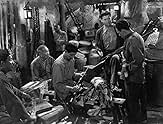NOTE IMDb
5,9/10
1,4 k
MA NOTE
Ajouter une intrigue dans votre langueThe lives of a small Chinese village are turned upside down when the Japanese invade it, and a heroic young woman leads her fellow villagers in an uprising against these invaders.The lives of a small Chinese village are turned upside down when the Japanese invade it, and a heroic young woman leads her fellow villagers in an uprising against these invaders.The lives of a small Chinese village are turned upside down when the Japanese invade it, and a heroic young woman leads her fellow villagers in an uprising against these invaders.
- Réalisation
- Scénario
- Casting principal
- Nommé pour 2 Oscars
- 3 victoires et 2 nominations au total
Philip Ahn
- Leader of City People
- (non crédité)
Albert Baldo
- Japanese Soldier
- (non crédité)
Avis à la une
Pearl Buck's novel "Dragon Seed" was made into a film in 1944. Back then, for reasons known only to themselves, the studios did not cast Chinese to play Chinese in major roles. Looking at the film now, I guess it's important to remember that to the 1944 audiences, there was nothing unusual about this.
Taking the non-Chinese casting out of the equation for just a moment, "The Dragon Seed" is a powerful story of what happened to the Chinese during the barbaric occupation of the Japanese.
The story focuses on the family of Ling Tan (Walter Huston), his wife (Aline McMahon), and his sons, Lao Er Tan (Turhan Bey) and wife Jade (Katharine Hepburn), Lao San Tan (Hurd Hatfield) and Lao Ta Tan (Robert Bice).
Jade is a modern thinker, and part of the story deals with the struggles between the new times and old traditions and the role of women. The other part of the story is how various people deal with the occupation. There is submissiveness, resistance, and collaboration.
I'm most moved by a review on this site by a man who has a Chinese father-in-law. His father-in-law loved the film. No one in China knew that America was on their side; they were taught to hate the western world.
So if a Chinese man can overlook the casting, I suppose I can too, but I can't. The acting is fantastic, but one wonders what was wrong with Anna May Wong, Keye Luke, Sen Yung, and why only the extras and children seemed to be at the very least Asian.
For me the most egregious casting was that of Katharine Hepburn. Her acting came alive in the second part of the film. She once said that Spencer Tracy made her seem very feminine. He's not in this movie.
In the beginning, in the love scenes with her husband, it doesn't come off. She's better when the character shows strength. Her finishing school accent and wig don't cut it either. Very difficult to watch. Also, she seems oddly matched with Turhan Bey.
This film is still well worth seeing. It's very dramatic and emotional, with a very big and poignant ending.
Taking the non-Chinese casting out of the equation for just a moment, "The Dragon Seed" is a powerful story of what happened to the Chinese during the barbaric occupation of the Japanese.
The story focuses on the family of Ling Tan (Walter Huston), his wife (Aline McMahon), and his sons, Lao Er Tan (Turhan Bey) and wife Jade (Katharine Hepburn), Lao San Tan (Hurd Hatfield) and Lao Ta Tan (Robert Bice).
Jade is a modern thinker, and part of the story deals with the struggles between the new times and old traditions and the role of women. The other part of the story is how various people deal with the occupation. There is submissiveness, resistance, and collaboration.
I'm most moved by a review on this site by a man who has a Chinese father-in-law. His father-in-law loved the film. No one in China knew that America was on their side; they were taught to hate the western world.
So if a Chinese man can overlook the casting, I suppose I can too, but I can't. The acting is fantastic, but one wonders what was wrong with Anna May Wong, Keye Luke, Sen Yung, and why only the extras and children seemed to be at the very least Asian.
For me the most egregious casting was that of Katharine Hepburn. Her acting came alive in the second part of the film. She once said that Spencer Tracy made her seem very feminine. He's not in this movie.
In the beginning, in the love scenes with her husband, it doesn't come off. She's better when the character shows strength. Her finishing school accent and wig don't cut it either. Very difficult to watch. Also, she seems oddly matched with Turhan Bey.
This film is still well worth seeing. It's very dramatic and emotional, with a very big and poignant ending.
When hard-working China is attacked by the power-hungry Japanese, a pre-feminist Chinese woman struggles with her family for survival; eventually she and her husband become fighters in the Resistance and help to influence their family and fellow villagers to join them. Hollywood product, with intentions that seem sincere, adapted from a Pearl Buck novel and starring...Katharine Hepburn? Actually, Kate is not flossy or "regal" here; she's nobody's fool and probably knows she's miscast, but her Asian make-up is commendable and she tries (not in vain) to find a character. In support, Walter Huston and Aline MacMahon, as Hepburn's Old World in-laws, are excellent. The movie has beautiful cinematography and absorbing passages, but its length is self-defeating and there are some howlers in the script and in much of the casting. Not a hit at the box-office, but by this time people were so used to Hepburn's hit-or-miss choices that it didn't hurt her. *** from ****
I was lucky to have watched this movie with my girlfriend's father, who is Chinese. Although he didn't understand a word, he LOVED IT! He was part of the original communist movement and could totally relate to the scenes of farmers taking up arms and meeting in the mountains to plan the fight against the Japanese invaders.
He wondered why, despite the fact that the budding commies in the movie were portrayed as very heroic, he'd never heard of this movie in China. Here is an American movie that glorifies his struggles - that was produced at a time when he was told to completely shun everything Western. Made him think a little, I bet.
Oh, and by the way, don't listen to what anybody else says about the white actors playing Chinese in this movie... it's almost painful to watch!
He wondered why, despite the fact that the budding commies in the movie were portrayed as very heroic, he'd never heard of this movie in China. Here is an American movie that glorifies his struggles - that was produced at a time when he was told to completely shun everything Western. Made him think a little, I bet.
Oh, and by the way, don't listen to what anybody else says about the white actors playing Chinese in this movie... it's almost painful to watch!
It may be disconcerting to see blue-eyed Caucasian actors playing Orientals, but once this initial distraction is over, the story of DRAGON SEED takes over and it's an engrossing one. Film's chief flaw is the fact that Pearl Buck's story is overlong--and so is the film.
Chinese villagers have to flee the enemy, Japanese soldiers, during the 1930s, and WALTER HUSTON and ALINE MacMAHON are the sturdy head of a family that includes daughter KATHARINE HEPBURN, as Jade. None of the three principals are particularly convincing in their Oriental make-up, but it's still fascinating to watch them perform.
HURD HATFIELD, TURHAN BEY, AKIM TAMIROFF, JACQUELINE DeWIT and HENRY TRAVERS are further examples of offbeat casting, but the grim story of survival of the fittest under cruel exploitation by the enemy is well crafted and always interesting to follow.
The film is photographed in meticulous B&W, crisply produced in the handsome MGM manner--with main attention going to Huston and MacMahon who do nicely in the leading roles. Hepburn, thankfully, is less mannered and less on display than usual. One of the most interesting scenes involves her decision to poison her brother-in-law during a banquet at his "mansion".
Summing up: Admirers of other Pearl Buck works (like THE GOOD EARTH) should find this unusual drama well worth watching. MGM should be commended for producing a very tasteful version of the novel. Story ends on a fever pitch with a graphic simulation of "the scorched earth policy" as practiced by the Chinese villagers.
Chinese villagers have to flee the enemy, Japanese soldiers, during the 1930s, and WALTER HUSTON and ALINE MacMAHON are the sturdy head of a family that includes daughter KATHARINE HEPBURN, as Jade. None of the three principals are particularly convincing in their Oriental make-up, but it's still fascinating to watch them perform.
HURD HATFIELD, TURHAN BEY, AKIM TAMIROFF, JACQUELINE DeWIT and HENRY TRAVERS are further examples of offbeat casting, but the grim story of survival of the fittest under cruel exploitation by the enemy is well crafted and always interesting to follow.
The film is photographed in meticulous B&W, crisply produced in the handsome MGM manner--with main attention going to Huston and MacMahon who do nicely in the leading roles. Hepburn, thankfully, is less mannered and less on display than usual. One of the most interesting scenes involves her decision to poison her brother-in-law during a banquet at his "mansion".
Summing up: Admirers of other Pearl Buck works (like THE GOOD EARTH) should find this unusual drama well worth watching. MGM should be commended for producing a very tasteful version of the novel. Story ends on a fever pitch with a graphic simulation of "the scorched earth policy" as practiced by the Chinese villagers.
Those who know little of the invasion of China by the Japanese Imperialist Forces during World War Two can discover general ideas surrounding this period of world history. Granted, the film is somewhat melodramatic in places, and, yes, Westerners made up to look Chinese is somewhat disconcerting as one begins to view this film. Yet, as the film progresses one is soon so overpowered by the action of the film that these minor distractions quickly evaporate. In fact, one soon accepts Katherine Hepburn as Chinese and the true drama dominates the film. The basic theme of the film is the repelling of aggressive forces in one's homeland, a not uncommon theme for 1944. Jade (Hepburn) must not only battle the invaders, she must confront traditional Chinese family values. Both conflicts are challenging to a peaceful rural village about to clash with the changes of the twentieth century. As the film progresses, the agony of family fracture and the immensely powerful drama of the last few scenes turn this film into a sober reminder of the mutability which comes with war. Hepburn is very good in this movie, as is almost all the supporting cast. The "kitchen scene" may be one of the most suspenseful of the World War Two period films. Viewers are reminded that the war between Japan and China began in 1937, four years before United States involvement.
Le saviez-vous
- AnecdotesFilmed in 1943 on the MGM lot in Culver City, CA, the film features an unusual assortment of non-Asian actors with odd accents playing Chinese and Japanese: Russian-born and Stanislavski-trained Akim Tamiroff as Wu Lien; Turhan Bey, Viennese born son of a Turkish father and Czechoslovakian mother as the middle son, Lao Er Tan; New England patrician Katharine Hepburn as his wife; American Aline MacMahon--no longer one of the wisecracking Chercheuses d'or de 1933 (1933)--as the wife of Ling Tang; English-born Henry Travers (best remembered as Clarence the Angel from La vie est belle (1946)) as the Third Cousin"; Irish-American J. Carrol Naish as the Japanese Kitchen Overseer; and finally Jewish Robert Lewis, co-founder of the Actors Studio and Meryl Streep's teacher at the Yale Drama School, as Japanese Capt. Sato.
- ConnexionsEdited from La terre chinoise (1937)
Meilleurs choix
Connectez-vous pour évaluer et suivre la liste de favoris afin de recevoir des recommandations personnalisées
- How long is Dragon Seed?Alimenté par Alexa
Détails
Box-office
- Budget
- 3 000 000 $US (estimé)
- Durée2 heures 28 minutes
- Rapport de forme
- 1.37 : 1
Contribuer à cette page
Suggérer une modification ou ajouter du contenu manquant

Lacune principale
By what name was Les Fils du dragon (1944) officially released in India in English?
Répondre


